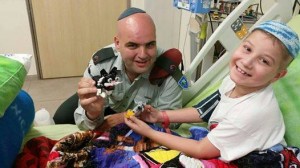
Love at first sight, that’s what Maor Cohen felt when he got his first Lego set at age five. “My Mom came home from a visit in Tel Aviv, the ‘big city,’ with a humongous Lego set that must have cost half her monthly salary. You have to understand that back then, in the beginning of the 1980’s, this was no trivial matter. I was so excited that I went to sleep at night hugging the box and the next day I couldn’t wait to come back from preschool and play with it.”
“From that moment, which remains vivid in my heart more than thirty years later, I never stopped developing my hobby. Every birthday present was Lego, and every bit of money I saved up as a child remained in my piggy bank until enough accumulated to buy a new set. I lived at the time in Yavneh and I would ride my bicycle all the way to Rechovot in order to buy Lego and save the cost of a bus ticket.”
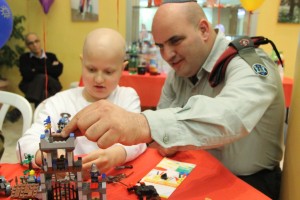
Throughout his youth, Cohen never abandoned his hobby. But, of course, as he matured, his focus turned to adult occupations. He served in the army, completed an officers’ course, and today, after finishing his academic studies through the army, is serving as a Major in the Manpower Department.
One day, he recalls, after realizing that he had accumulated in his home an unimaginable amount of Lego, worth hundreds of thousands of shekels, he decided that it was time to pass the pieces on to somebody else who would enjoy them. “I wanted to do something good with the Lego. I turned to my friend, Rabbi Eitan Eckstein, who suggested that I donate the collection to Oranit, Ezer Mizion’s Donald Berman Rehab Center for Support of Cancer Patients and their Families.
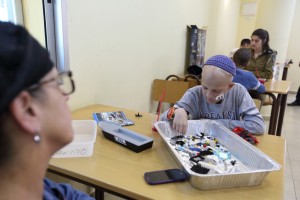
When I arrived at Oranit, my plans changed. Drastically. “I came there intending to simply donate the Lego and go my merry way. Oranit staff had a different idea. “Suppose you keep the Lego and use it for a club, showing the kids how to use it. You’ve got the skills. You’ve got the know-how. You could accomplish so much. You could put life into those kids (and maybe even adults). Dealing with cancer is frightening. It’s depressing. Having a project like Lego to look forward to would work wonders.”
“They were so convincing that I tried giving the workshop that very day. I recall hesitantly entering the playroom with a few pieces of Lego and three children and we started building. Well, it worked. The kids loved it. Every week, the number of kids increased, and today there are almost thirty children participating.
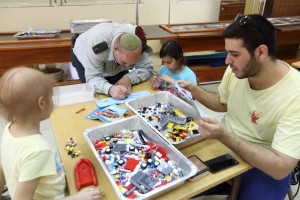
From that moment five years ago, Maor Cohen has been running the Lego Club in Oranit on a volunteer basis. With time, the project expanded. Others volunteered to assist him. Nir Solomon, who served as Cohen’s brigade commander in the past and is now retired uses his free time help Maor run the club. Four other volunteers also come regularly. Even Maor’s immense collection has its limits but many have been fascinated by the project and offered to help finance new Lego sets. Maor’s brother is one of these. “He was very excited by the idea and asked to donate money so that I could buy the kids Lego as a gift. That would enable them to have Lego not only during the club time but also at home and with them during their treatments.”
Neither sun, nor rain, nor the security situation can deter the energetic Lego man. “The club is now in its fifth year, and it takes place once a week, no matter what. At most, I push it off a day, because I know that the child and his family are waiting for me. In addition to the club, I also make the rounds in the Oncology wards of the hospitals 3-4 times a week and build with the hospitalized children.”
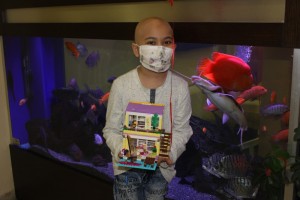
Why Lego? “First of all, Lego is great fun. I also think that it is especially important for these kids, because with Lego, there is a feeling of continuity. All that planning gives them a sense of a future.
Dr. Bracha Zisser, Director of Oranit, explains that Oranit was founded in order to relieve patients and their families during the difficult period of treatments. “We operate as a guest house that enables families to sleep over in the Center of the country near treatment centers to avoid the long, grueling hours of traveling. We also organize trips and social activities. In addition, we provide many forms of therapy for both patient and his family. We are constantly expanding our activities in order to enable every person, the patient or his family member, to connect with activities that speak to him.
Maor has got to know Oranit and its staff over the years. “Oranit is an amazing place. They provide support in the most difficult moments, both to children who are sick and to children with a sick parent, and actually to the entire family, in the knowledge that the family is the circle surrounding the child.”
If you’d like to join the LegoMan in his humanitarian work, just click here and type lego into the memo field.
